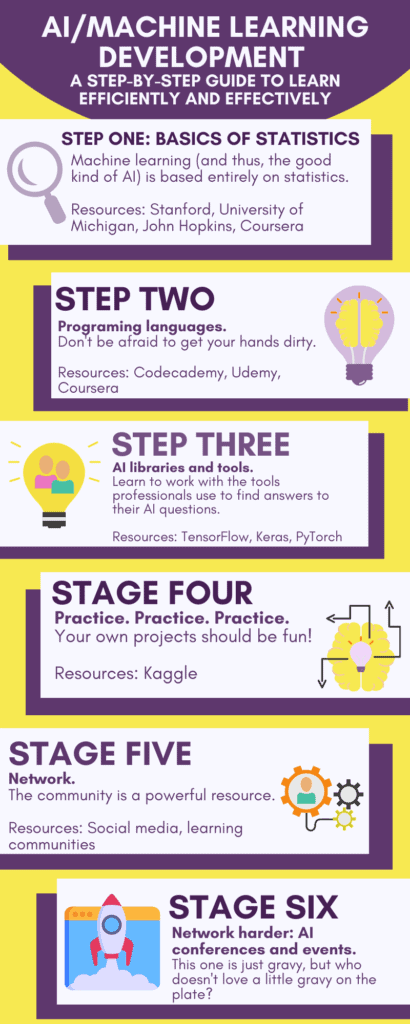Whether you’re wary or curious about AI development, the writing is on the wall: AI is here to stay and it is already sweeping across industries, making changes—for better or worse.
Personally, when I’m nervous or confused about something, my first course of action is always to pick it apart.
Can’t be afraid of something I can dismantle, right? 😂
If you’re of a similar mindset, here is a quick list of what I did while I was exploring the ways to learn to speak ‘future overlord.’
First of all, I began my AI development journey with the skills I already had. There’s a lot that can be said about the programming side of AI development, but my language skills weren’t even the most useful block in the chain:
- My first recommendation to anyone who wants to get a firm grasp of AI development is to wrap your head around statistics. Machine learning (and thus, the good kind of AI) is based entirely on statistics. You thought that NLP just liked casual conversation? No, ma’am. It is running tens of thousands of checks in the background to spit out the most probable answer you’re looking for. Honestly, AI statistics feeds my love of practical math. Stanford, University of Michigan, and John Hopkins all have free statistics courses you can sign up for here. Online courses like Andrew Ng’s Machine Learning Course on Coursera or the Fast.ai course are great resources to learn the basics of machine learning How and Why.
- After you have a solid understanding of statistics, you can dive into your programming language. I already knew Python and it’s super flexible, so that’s what I used. That said, AI development is done in pretty much every language under the sun. If you can’t find your niche, look into game development. We’re pretending AI is a new thing, but if you’ve ever watched an NPC bumble through an escort quest (shudder) you’ve been interacting with some kind of AI for a while. You can start by taking online courses, such as those offered by Codecademy, Udemy, or Coursera. These courses will teach you the basics of Python and how to use it for data analysis and manipulation.
- Next, we get into the nitty-gritty of implementation. Learn about AI libraries and tools: There are many open-source libraries and tools available for AI development, such as TensorFlow, Keras, and PyTorch, to name a few. Keep in mind, I’ve only utilized these libraries with Python; mileage will differ if you selected another language. You can find tutorials and documentation for these tools online, and practice using them with sample datasets.
- This next step is probably the most difficult. Because we can read books about building bridges until our eyes roll back in our heads, but until we get some blocks in our hands, we’re just talking probabilities. You’ve got to work on projects. Building your own projects is an effective way to learn and practice AI development. You can start with small projects, such as image classification or sentiment analysis, and work your way up to more complex projects like building chatbots or recommendation systems. Just keep in mind that these projects don’t have to be boring! Kaggle has a ton of datasets to play with, but you can also make your own. My first AI project was a recommendation engine for a crafting game: you put in your ingredients and it told you what you should make with it to maximize your ROI. Yes, I am that kind of gamer.
- Join AI communities: Joining online AI communities, such as Reddit’s r/artificial, can be a great way to learn from others and get feedback on your projects.
- If you have the resources—and passion, because let’s be honest, we’re just nerding out at this point—attend AI conferences and events. Events such as the annual NeurIPS or ICML conferences, can help you stay up to date with the latest research and trends in the field.
Overall, the key to maximizing your time while learning AI development is to stay focused, be consistent, and practice as much as possible. Leverage what you already know and remember to have fun!

